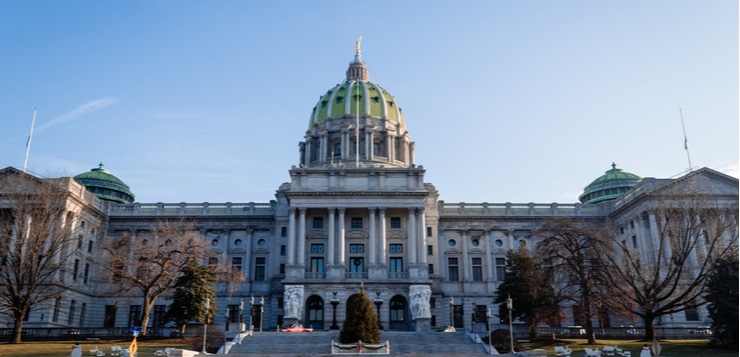Unlike the casino industries of some states, Pennsylvania’s has no organized association to lobby with one voice on behalf of gaming interests.
That’s why it’s always interesting when there’s something afoot in Harrisburg that prompts the various companies to speak as one.
And so it is with SB 1256, a proposal sponsored by Senate Majority Leader Jake Corman that would potentially add tens of thousands of legal VGT machines — similar to casino slots — to clubs and taverns statewide.
The measure introduced in bill form by the influential Republican leader July 30 — a month after its intent was discussed behind closed doors of the Senate Republican caucus without any public airing or vote — is now slated for a public hearing by the Senate Community, Economic and Recreational Development Committee at the Capitol Oct. 6.
And those representing Pennsylvania casinos don’t like it one bit.
All 13 casinos state objections in letter
A letter sent Sept. 17 to legislative leaders bore the logos and names of executives of 13 Pennsylvania casinos — the 12 existing and the under-construction Live! Philadelphia property.
The letter said SB 1256, if passed, “would result in as many as 85,000 gambling machines being added to the state” and “would cause tremendous damage to our industry and the nearly 20,000 Pennsylvanians we are proud to employ, as well as negatively impact the Pennsylvania Lottery and the public interest.”
The state’s casinos have about 24,000 slot machines, only two-thirds of them in use presently due to social distancing restrictions created by COVID-19. Another nearly 200 VGTs are legal at truck stop locations permitted to have five machines each.
Many thousands of illegal or questionably legal machines are in use, however, in clubs, bars, restaurants, convenience stores, and other locations around the state. SB 1256 would legalize VGTs and so-called “skill game” machines in those that are licensed liquor establishments.
“The bill is bad public policy and comes as our industry continues to reopen after remaining shuttered for nearly four months due to the COVID-19 pandemic,” the casinos’ letter states.
“We recognize that hundreds of struggling restaurants, bars, and other liquor-licensed business and organizations in our Commonwealth are also grappling with the economic impact of the pandemic. However, help for liquor licensees should not, and does not have to, come at the expense of our industry.”
Lawmakers will need to shore up budget this fall
Pennsylvania’s finances, like those of all states, are hurting due to the economic effects of COVID-19 on income and sales that represent the bulk of the state’s revenue.
Due to uncertainty surrounding the budget and ability to rebound from COVID-19, the legislature passed only a partial budget for the 2020-21 fiscal year in June. Lawmakers and Gov. Tom Wolf left it until after the November election to discuss the means of solving budget challenges for the remainder of the fiscal year.
Corman has laid out his proposal as one means of doing that — by collecting revenue from fees and taxes associated with legalizing the VGTs and skill games, although SB 1256 omits specific mention of how much the machines should be taxed.
Casino slots are taxed at 54%, among the highest rates in the nation, and the Pennsylvania gaming executives argue that they were willing to tolerate the rate while investing in hefty licensing fees and capital costs of construction only because they assumed they would face no additional competition aside from one another.
“The state’s gaming industry has made a multibillion-dollar investment in Pennsylvania that has resulted in the generation of over $17 billion in gaming tax revenue, the creation of nearly 20,000 direct jobs, and the support of too many local businesses to count,” the casinos’ letter states.
“In making this investment, we relied on Pennsylvania’s gaming laws and landscape — and in the reasonable belief that, as a nearly 57% stakeholder in our business, the Commonwealth would be a good-faith partner.”
At the Oct. 6 Senate committee hearing, representatives of the casinos will almost certainly testify in similar fashion. At the same time, proponents of the bill from the tavern industry and fraternal clubs will likely appear.
No vote by the committee would typically take place at that time, but the hearing could set the stage for an interesting fall debate over whether Pennsylvania should look to yet another gambling expansion as a way of solving its budget dilemma.






